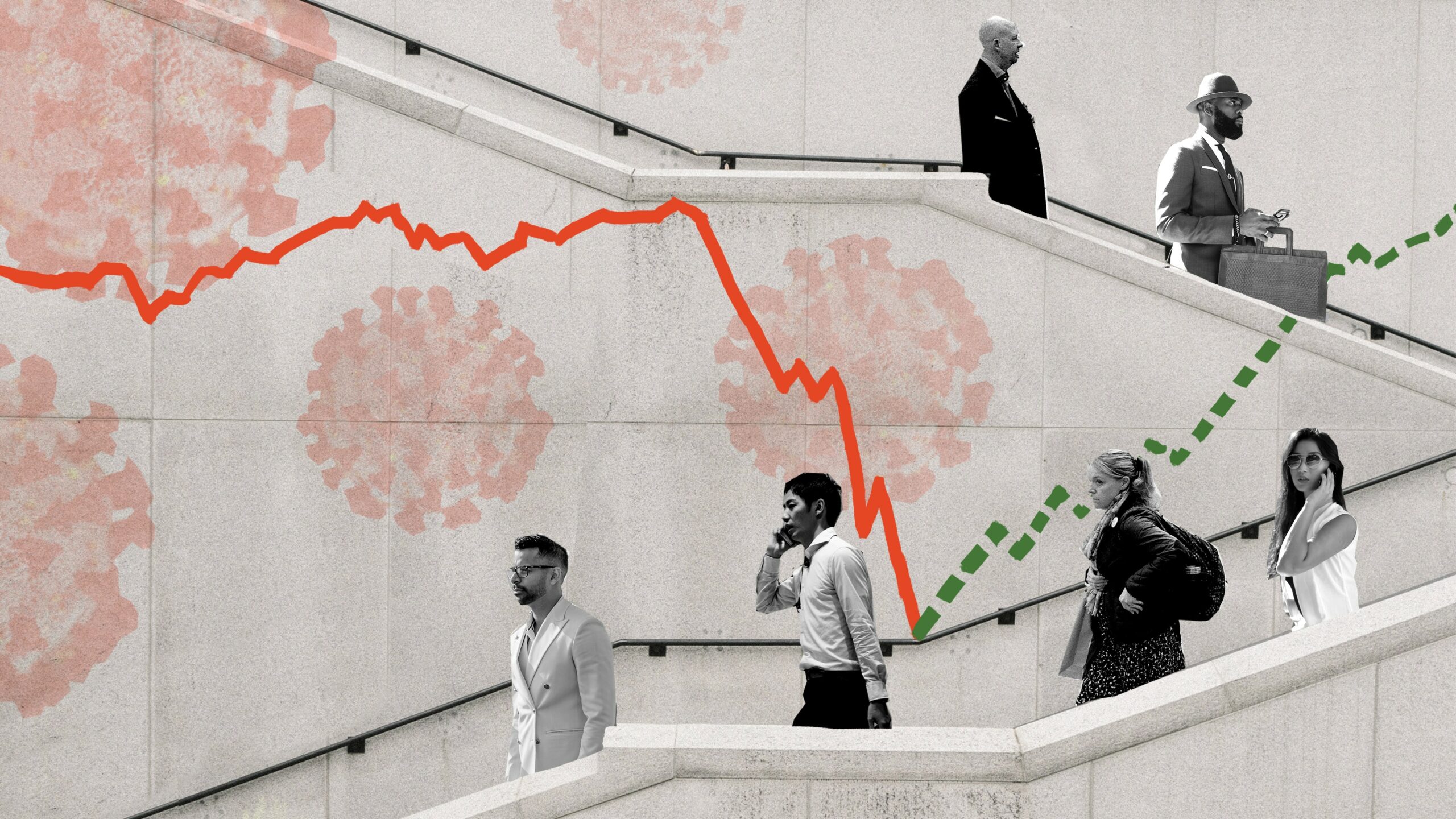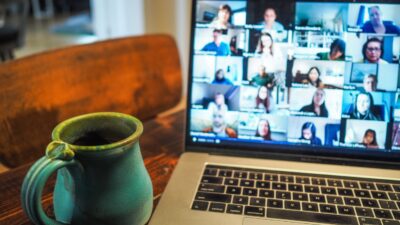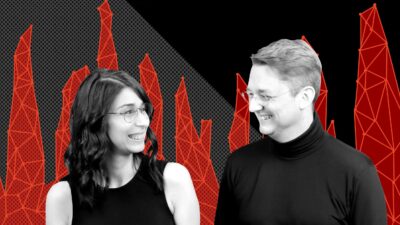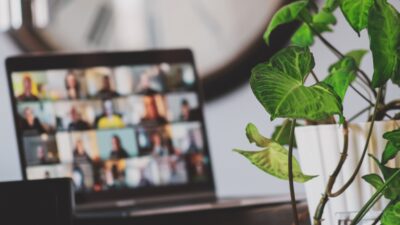Sandra Peter and Kai Riemer

Wellbeing on Corona Business Insights
Wellbeing, burnout and memory fog: part three of a series looking at shifting working practices, distributed and hybrid work.
As COVID-19 sets out to change the world forever, join Sandra Peter and Kai Riemer as they think about what’s to come in the future of business.
Shownotes
Sydney Ideas panel on pandemic fatigue, young people and mental health
We need to start talking about burnout
What the pandemic does to the brain
How lockdown scrambles your memory and sense of time
Our previous conversations on working from home, Zoom fatigue, productivity and remote work and reorganising for hybrid work
This episode is part of a podcast series covering what COVID-19 will mean for the business world, where we look at the impact on the economy, businesses, industries, workers and society. This is part of our ongoing coverage of the impact of COVID-19 on the future of business.
Follow the show on Apple Podcasts, Spotify, Overcast, Google Podcasts, Pocket Casts or wherever you get your podcasts. You can follow Sydney Business Insights on Flipboard, LinkedIn, Twitter and WeChat to keep updated with our latest insights.
Send us your news ideas to sbi@sydney.edu.au.
Dr Sandra Peter is the Director of Sydney Executive Plus and Associate Professor at the University of Sydney Business School. Her research and practice focuses on engaging with the future in productive ways, and the impact of emerging technologies on business and society.
Kai Riemer is Professor of Information Technology and Organisation, and Director of Sydney Executive Plus at the University of Sydney Business School. Kai's research interest is in Disruptive Technologies, Enterprise Social Media, Virtual Work, Collaborative Technologies and the Philosophy of Technology.
Share
We believe in open and honest access to knowledge. We use a Creative Commons Attribution NoDerivatives licence for our articles and podcasts, so you can republish them for free, online or in print.
Transcript
Intro From The University of Sydney Business School, this is Sydney Business Insights.
Sandra And this is Corona Business Insights. I'm Sandra, Peter.
Kai And I'm Kai Riemer.
Sandra We're back unpacking the impact of COVID-19 on business, the economy, industry, government, workers and society and looking at the effects of the pandemic while still in lockdown here in Sydney.
Kai And this podcast is part of a larger initiative by The University of Sydney Business School. And you can still find our COVID business impact dashboard online at sbi.sydney.edu.au/coronavirus.
Sandra And today we're back taking a look at where the COVID-19 pandemic has left us on a range of topics and revisiting wellbeing. And this is part three of a series looking at changes in our work practices and the future of hybrid work. And our previous episodes have looked at the move to remote work and the implications for productivity.
Kai And in the next episode, we will revisit relationships and culture as we look at shifting work practices, distributed and hybrid work.
Sandra Since the first wave of the pandemic, we've been talking a fair bit about wellbeing especially with the move to remote work, and working from home now we're back in lockdown, so very front of mind for many of us a conversation around wellbeing.
Kai And before we delve into the many facets of wellbeing or lack of wellbeing during lockdown while working from home, remote working, it's worth looking at what the conversation about working from home was like pre-pandemic.
Sandra And pre-pandemic the conversation was fairly simple when we discussed wellbeing and especially working from home. working remotely was always positively associated with increased autonomy, it had spill over effects into job satisfaction with people reporting higher job satisfaction when they were working from home. And we'll include a couple of studies as always, in the shownotes.
Kai Yeah, it was really about better work-life balance, right. So remember, working from home was something that people elect to do. Very few people would work from home permanently. So it was a way to get away from the hustle and bustle of the office, to have some concentrated work, or just work among the people at home and not having to commute, for example.
Sandra Indeed, commuting was negatively associated with wellbeing, with studies showing that an additional 20 minutes of commuting reduced wellbeing by as much as a 19% pay cut. So an additional 20 minutes spent on the bus or on the train, people perceived it as bad as getting an almost 20% pay cut.
Kai That's especially when people already had a fairly long commute. As you know, house prices in places like Sydney would drive people out to the suburbs. And all of this changed radically as the world was plunged into the first lockdowns as everyone found themselves at home, children, pets, partners included. The situation of working from home all of a sudden became just work and life all rolled into one, no thinking about work-life balance really. And even thinking around the commute changed.
Sandra There were first of all the usual suspects, right, we started spending a lot more time on work. And we talked about this at length in our previous productivity episode, people having meetings into all hours of the nights and sending emails and sending messages, then there was all the trouble associated with remote meetings. So zoom fatigue. And again, we've had a whole episode around video conferencing and zooming and of course, zoom fatigue very real. Again, we'll put the links in the shownotes.
Kai But that was compounded by the general anxiety and stress around the lockdown around the uncertainty about what would happen to my job? And the loss of social contacts as people found themselves now in scheduled Zoom meetings rather than bumping into people in corridors or in the coffee shop.
Sandra And it turned out that even the commute, the lack of the commute led to an overall decrease in wellbeing as people missed the time that you would spend on the bus or on the train. And that clear demarcation between work and life.
Kai And that's a really interesting insight right, where the lockdown and work from home was one of those natural experiments that let people study phenomena like the commute, where it turns out that people actually start missing the commute because it was this physical boundary between the work life and the personal life, between those contexts. It allowed people to basically transition in an orderly way. And that broke away as we mentioned. In the previous episode,
Sandra But probably the biggest insight into wellbeing during the pandemic, and as many of us are still engaged in remote work, and many people are working at least part of the time from home around the world, the biggest insight has been that the impact of the pandemic on wellbeing and on mental health appear to have been disproportionately affecting certain groups.
Kai So first of all, research has shown that managers reported much higher levels of wellbeing, much less problems with mental health than their subordinates. Likely because they were more connected, they had a better overview, more social interactions and less isolation.
Sandra So while 61% of leaders were describing themselves as 'thriving', research showed that subordinates, so those who didn't have a say in decision making were thriving 23% less than their bosses were.
Kai And then there's the gender gap with women disproportionately having to attend to home duties and childminding home schooling, therefore reporting much higher levels of stress than male workers.
Sandra And most of all, the pandemic seems to have affected the mental health and wellbeing of young people.
Kai That is, on the one hand, the people who are early in their career, but also young people more generally.
Sandra And we'll include a link in the shownotes to a Sydney Ideas event that looked at pandemic fatigue in young people and how their wellbeing and mental health was affected disproportionately to other groups.
Kai Among other things, a panel discussed recent data from the Australian Bureau of Statistics that showed that about 30% of young people reported high or very high levels of distress during the pandemic, and that is teenagers and young adults, which are concerning numbers, and which has a spill over effect on how well people will then do in their jobs and perform in their work as they are stuck at home.
Sandra But since we've all been now stuck at home for a very long time. So unlike the beginning of the pandemic, when it was all new and we were just figuring out how we're doing this, we've now been at this for more than a year and a half.
Kai Yeah, the excitement of, you know, baking sourdough bread or having zoom cocktails, all of that has really gone away. So there's not only zoom fatigue, there is lockdown fatigue work from home fatigue. And that shows in statistics around wellbeing and burnout.
Sandra And so we must mention burnout, right, a condition that might start with a gradual lack of energy and tiredness, but which then builds into a sense of exhaustion, which then doesn't leave you and you feel apathy towards your job, things you previously enjoyed. Your productivity drops, or at least it feels like it does. And everything you try to do to compensate for these things just seems to make it worse and worse, and you feel even more tired. So you're probably burned out.
Kai And that was a really interesting article in Wired Magazine, which we will put in the shownotes making the argument that it is time to have a renewed conversation as a society around burnout to normalise the discussion, because on the one hand, there are typical professions where burnout is almost worn as a badge of honour, hardworking office workers, knowledge workers, that work themselves to exhaustion and of course, there's differences in different cultures, and maybe health professionals but there are other professions where burnout is just as prevalent, where mental health issues carry a stigma and where this condition is not recognised at all.
Sandra But these are, of course, highly unusual circumstances we find ourselves in so not only our jobs have changed, but the way we interact with our families with our communities, the way we spend, our holidays have changed.
Kai And so there's no compounding effects when it comes to burnout. So on the one hand, there might be underlying issues in someone's job where there is a mismatch between the person and the role, and there was already tension which has been aggravated by the pandemic, by working from home, by a lack of enjoyment of not meeting colleagues which might have masked that on their stress in the job. But there's also genuinely new circumstances that have led to burn out such as home schooling, the lack of separation between work and life. And so the author's make the argument that we really need a widespread recognition of this phenomenon, and that employers have to take this into account when managing their workforce, as we transition into hybrid, or still being stuck in lockdown SBI in Sydney.
Sandra And this highly unusual circumstances don't just lead to burnout. We know for instance, from research in the US that more than 40% of Americans reported some symptoms of anxiety or depression and that these rates are about double what they were before the pandemic. And this often translates into people not necessarily experiencing burnout, but people experiencing you know, pandemic brain fog or forgetfulness, or difficulty concentrating, difficulty being productive, just some general fuzziness.
Kai So there seems to be a real impact of the pandemic, the working from home the monotony of being stuck in lockdown on the brain itself, but also on our cognitive functions, such as making memories or having a sense of time.
Sandra Which both reduce our sense of wellbeing and our experience of the workday and of just days in general, right, we're calling them 'twodays' now because they all...
Kai Just like the other day. And there's a real issue now with for example, remembering things and knowing when things happened, because it turns out that for having a good sense of time, we need to change in our life, and for making memories. We need memorable experiences, like changing context, being in different places, or having different things happening. If every day is the same. It is very hard to, you know, know what happened and when it happened.
Sandra Yeah, what day is it today? What week is it? Now when did I last order my groceries online? And cognitive scientists have coined the term 'contextual binding theory'. So a theory according to which memories are formed by linking the things you experience to the context in which those events occurred. So of course, if we're commuting to work, if we are in an office, if we have just bought a cup of coffee, or we've gone to a conference, or we've gone to a meeting room, we remember all those little details.
Kai And they act as pointers in our brains to retrieve the kind of things that we experienced. So the more varying the context are, the better the brain is able to actually access those memories. If your entire life revolves around the same kitchen table, or on the same couch, on the same screen with the same Zoom every day, it is very hard for the brain to make the kinds of distinctions that will allow you to later access any meaningful memories.
Sandra And let's spare a thought now, not only for all those people trying to learn how to bake a loaf of bread online, but also for the many students, many of our students who are now stuck doing all of their classes all of their studies online. Not an easy thing where in lockdown all of the experiences we have, have more or less the same context.
Kai So what contextual binding theory would say is that when you transition between different lecture rooms, when you're meeting people in the cafeteria, when you have varying contexts, what you learn will also be remembered better by the brain, the brain can access those experiences much better. So there is a real challenge now for our students who are now learning on Zoom, and who do not have the variety in their lives of changing contexts.
Sandra So where does this leave us as we're still stuck in a pandemic in terms of wellbeing?
Kai First of all, we need to recognise that mental health, lack of wellbeing does not affect everyone equally, as we mentioned.
Sandra We've said the burden has fallen on young people, on women disproportionately, so we need to pay more attention to certain groups.
Kai On the other hand, we can do certain things, making our lives a little bit easier around the mental fork, for example, in building memories. So changing location around the house, going for a walk during a lunch break, breaking up the day, trying to deliberately insert some variety into one's day will help the brain stay fresh and make those memories and give us a better sense of time as we make our way out of the pandemic.
Sandra And also importantly, remembering to check in on those we work with. Even if we don't necessarily have a reason maybe reaching out to colleagues you haven't spoken to or seen in a while seeing how they're doing.
Kai Yes, because the lack of social contact, the lack of informal meetings with other people is a major contributor to the drop in wellbeing during the pandemic. And because it's such an important topic our next episode we'll take a closer look at those relationship aspects.
Sandra Of course wellbeing is only part of the story of hybrid or distributed work.
Kai We've already looked at productivity for example, so next time, we'll look at relationships and culture.
Sandra But that's all we have time for today.
Kai Thanks for listening.
Sandra Thanks for listening
Outro From The University of Sydney Business School. This was Corona Business Insights, the podcast that explores the future of business in the wake of the global pandemic.
Sandra Connect with us on LinkedIn, Twitter, WeChat and Flipboard. And subscribe like or leave us a rating wherever you get your podcasts.
Close transcript





